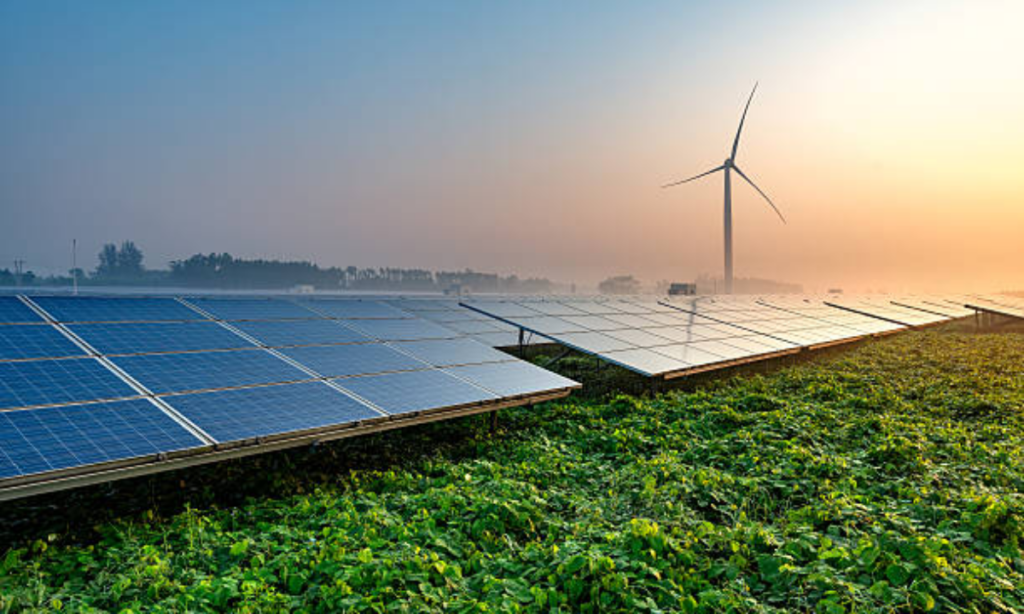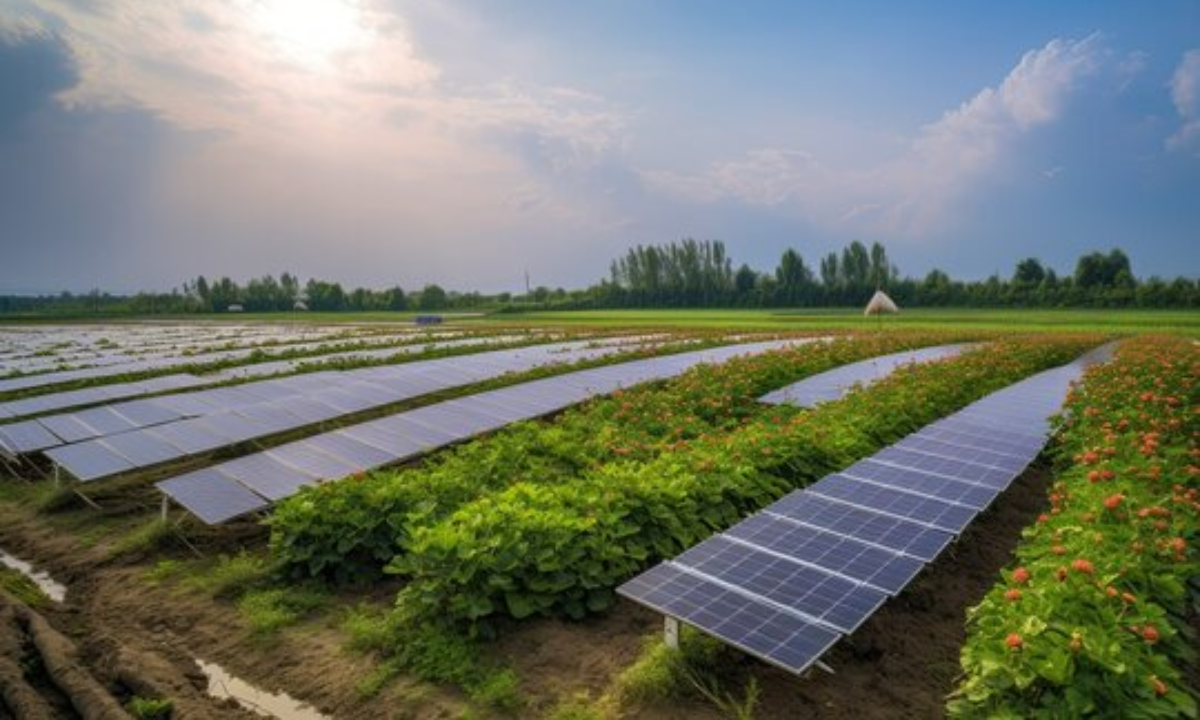Solar-powered agriculture appears to be a critical crop production option in today’s world, where there is an increasing desire for environmentally friendly techniques. Given the growing concern about climate change and the desire for clean energy, solar power offers tremendous opportunities to improve our approach to food production.
Harvesting the sun’s abundant energy can help farmers lessen their dependence on fossil fuels while also lowering their carbon imprint. Solar panels, particularly well-known brands such as Panasonic Solar Panels and Adani Solar Panels, are used in agriculture to give a consistent supply of clean electricity to irrigation systems, machinery, and other farming operations. This not only reduces greenhouse gas emissions, but also lowers production costs, increasing agricultural profitability.
Furthermore, solar-powered agriculture opens up off-grid farming opportunities, particularly in remote places with limited access to energy. This strategy allows farmers to plant food in a sustainable and self-sufficient manner, supporting both food security and rural development.
What does solar-powered agriculture involve?
Solar-powered agriculture, also known as solar farming or agrivoltaics, is an innovative technique to collect solar energy for a variety of farming operations by seamlessly integrating solar panels into agricultural landscapes. This odd combination allows farmers to grow food while generating clean, renewable electricity.
Solar-powered agriculture is remarkably simple to operate. Solar panels are strategically placed on elevated structures or between crop rows. These panels effectively absorb sunlight and turn it into electricity, which is then used to power various farming activities such as irrigation systems, machines, and lights.
Most importantly, solar-powered agriculture is not limited to certain crops or farming methods. It works smoothly with both traditional and modern farming systems, including organic farming, hydroponics, and vertical farming. Its adaptability makes it accessible and adaptable to the many demands of farmers, regardless of farming technique.
The incorporation of solar panels into agricultural landscapes provides numerous benefits to farmers and the environment alike. From increasing energy independence to lowering carbon footprints, the partnership between agriculture and solar electricity has enormous promise for sustainable farming methods. This transformational paradigm change is aided by top solar panel distributors such as Panasonic Solar Panels and Adani Solar Panels, paving the path for a greener, more resilient agricultural future.
Benefits of Solar-Powered Agriculture:

Solar-powered agriculture has several benefits that extend well beyond the fields. First, it reduces dependency on fossil fuels, resulting in decreased greenhouse gas emissions and air pollution. Farmers can lower their carbon footprint by utilizing clean and renewable energy sources such as solar panels, producing a healthier ecosystem and combating climate change.
Furthermore, this innovative method lowers long-term production costs. While solar panel installations need some initial expenditure, the energy cost benefits are significant. Farmers with lesser overheads may be able to better manage resources, thereby increasing the affordability and accessibility of food to customers.
Furthermore, solar-powered agriculture promotes energy independence, especially in distant places that lack access to traditional power grids. Farmers gain control over their operations by utilizing solar energy, which encourages rural development and food security.
Furthermore, the shadowing effect of solar panels above fields enhances microclimates, resulting in increased crop yield. Precise control over lighting conditions allows for ideal growing conditions, perhaps resulting in increased yields and crop quality.
Finally, solar-powered agriculture allows farmers to diversify their revenue streams by selling extra electricity back to the grid. This extra cash stream not only stabilizes finances but also contributes to long-term sustainability efforts.
Leading solar panel wholesalers such as Panasonic Solar Panels and Adani Solar Panels are critical in aiding the shift to a greener, more sustainable agricultural future.
Solar-powered farm equipment
Solar-powered agriculture contains more than just field installations; it also includes a wide range of solar-powered farming equipment designed to increase agricultural efficiency and sustainability.
Solar-powered tractors and equipment are at the forefront of this innovation, providing farmers with cleaner and more environmentally friendly alternatives to typical diesel or gasoline engines. Solar-powered tractors charge their batteries using solar energy, which eliminates the need for fossil fuels during plowing and harvesting.
Aside from tractors, solar-powered technology such as irrigation pumps, grain dryers, and milking machines are transforming agriculture by lowering environmental impact and production costs.
Solar-powered agriculture encompasses not only field installations, but also a wide range of solar-powered farming equipment designed to improve agricultural efficiency and sustainability.
Solar-powered tractors and equipment are at the forefront of this innovation, offering farmers cleaner and more ecologically responsible alternatives to traditional diesel or gasoline engines. Solar-powered tractors charge their batteries with solar energy, eliminating the need for fossil fuels for plowing and harvesting.
Aside from tractors, a variety of solar-powered technologies, such as irrigation pumps, grain dryers, and milking equipment, are transforming farming operations. These devices use solar electricity to drastically reduce the environmental impact of agriculture while simultaneously lowering production costs.
Conclusion
Solar-powered agriculture is a huge step toward sustainable food production. Using solar energy can help farmers reduce their reliance on fossil fuels, lower production costs, and boost agricultural output. Installing solar panels not only offers clean electricity, but it also encourages self-sufficiency and environmental responsibility.
This transformative method has far-reaching consequences that extend beyond agriculture. It helps climate change mitigation by lowering emissions and supporting environmentally beneficial practices. Furthermore, it empowers remote farmers, boosting rural development and improving food security.
As we strive for a more environmentally friendly future, we must embrace solar-powered agriculture. Collaboration among governments, agricultural organizations, and farmers is critical to its proliferation. By promoting this technology, we can transform agricultural farming, providing a more sustainable and resilient food landscape for future generations. Leading solar panel distributors, such as Panasonic Solar Panels, are critical players in this transformation.
Sun-AP Ecopower is one of the leading solar panel distributors in India, providing high-quality solar products nationwide.




